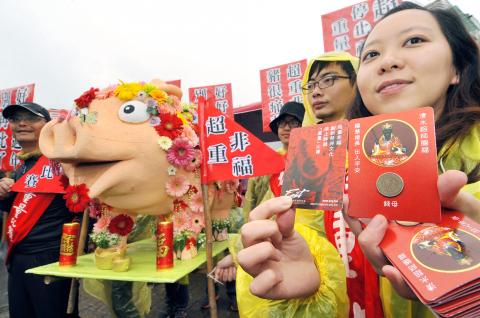Animal rights advocates yesterday rallied outside the Chingshui Zushi Temple (清水祖師廟) in Sansia District (三峽), New Taipei City (新北市), urging an end to “divine pig” contests.
Chanting “overweight pigs do not bring fortune” while parading a model of a cartoon pig on the bridge leading to the temple, the advocates urged passers-by to join their campaign to halt the practice, the last such contest in the Taipei metropolitan area.
“I would like to make it clear that we are not against the tradition of having pigs as offering to deities and immortals, but if you choose to do this, please buy pigs that are raised in a healthy way and slaughtered humanely,” Environmental and Animal Society Taiwan (EAST) director Chen Yu-min (陳玉敏) told the crowd.

Photo: Chen Chih-chu, Taipei Times
“Pigs normally grow to over 100 jin [60kg], but the divine pigs are force-fed and grow to about 1,000 jin or more, then have their throats cut while they are conscious. This is unhealthy, cruel and inhumane,” Chen said.
She said that all deities are merciful and would not appreciate offerings that cause suffering in living creatures.
“Don’t forget that Chingshui Zushi was a learned and much respected Buddhist master and a vegetarian,” Chen said.
According to tradition, the heavier the pig that a devotee presents as an offering, the more sincere the devotee, though both Buddhist and Taoist teachings urge vegetarian offerings at religious rituals.
While contests on the weight of divine pigs were once popular across the country, only a few temples still hold such events.
In Sansia, seven family clans take turns each year to be in charge of raising such pigs, receiving certificates and medals according to the weight of the animals.
According to EAST, there are 126 Chingshui Zushi temples across the country, but the Sansia temple is the only one still holding annual divine pig contests.
Most people at the event reacted positively to the call.
“Killing is discouraged in Taoism, so why kill pigs for deities? Pigs are also living creatures,” a local resident surnamed Wu (吳) said.
A man surnamed Chang (張), who traveled to Sansia with his family to attend the festivities, said that he did not see the point in having overweight pigs as offerings.
Another man, surnamed Huang (黃), from Fusing Township (復興), Taoyuan County, said that there are alternatives to offering pigs.
“A few years ago, when I had to prepare an offering for deities at a temple in my hometown, I made a ‘divine pig’ with bags of rice, with each bag weighing 20kg,” Huang said. “After the ritual, I gave the rice to poor families. I think this is a better idea.”
Responding to the activists, the temple’s executive director Liu Chin-ta (劉金達) said that it may consider ending the divine pig contest in 2017.
“Seven clans take turns to raise divine pigs, so each cycle lasts seven years. The current cycle started in 2010, and since we cannot just stop it, we have to wait until at least 2017 to put an end to the practice,” Liu said. “Of course, it’s up to the temple’s board of directors to make the final decision on the matter.”

SECURITY: As China is ‘reshaping’ Hong Kong’s population, Taiwan must raise the eligibility threshold for applications from Hong Kongers, Chiu Chui-cheng said When Hong Kong and Macau citizens apply for residency in Taiwan, it would be under a new category that includes a “national security observation period,” Mainland Affairs Council (MAC) Minister Chiu Chui-cheng (邱垂正) said yesterday. President William Lai (賴清德) on March 13 announced 17 strategies to counter China’s aggression toward Taiwan, including incorporating national security considerations into the review process for residency applications from Hong Kong and Macau citizens. The situation in Hong Kong is constantly changing, Chiu said to media yesterday on the sidelines of the Taipei Technology Run hosted by the Taipei Neihu Technology Park Development Association. With

A US Marine Corps regiment equipped with Naval Strike Missiles (NSM) is set to participate in the upcoming Balikatan 25 exercise in the Luzon Strait, marking the system’s first-ever deployment in the Philippines. US and Philippine officials have separately confirmed that the Navy Marine Expeditionary Ship Interdiction System (NMESIS) — the mobile launch platform for the Naval Strike Missile — would take part in the joint exercise. The missiles are being deployed to “a strategic first island chain chokepoint” in the waters between Taiwan proper and the Philippines, US-based Naval News reported. “The Luzon Strait and Bashi Channel represent a critical access

CARROT AND STICK: While unrelenting in its military threats, China attracted nearly 40,000 Taiwanese to over 400 business events last year Nearly 40,000 Taiwanese last year joined industry events in China, such as conferences and trade fairs, supported by the Chinese government, a study showed yesterday, as Beijing ramps up a charm offensive toward Taipei alongside military pressure. China has long taken a carrot-and-stick approach to Taiwan, threatening it with the prospect of military action while reaching out to those it believes are amenable to Beijing’s point of view. Taiwanese security officials are wary of what they see as Beijing’s influence campaigns to sway public opinion after Taipei and Beijing gradually resumed travel links halted by the COVID-19 pandemic, but the scale of

Pope Francis is be laid to rest on Saturday after lying in state for three days in St Peter’s Basilica, where the faithful are expected to flock to pay their respects to history’s first Latin American pontiff. The cardinals met yesterday in the Vatican’s synod hall to chart the next steps before a conclave begins to choose Francis’ successor, as condolences poured in from around the world. According to current norms, the conclave must begin between May 5 and 10. The cardinals set the funeral for Saturday at 10am in St Peter’s Square, to be celebrated by the dean of the College